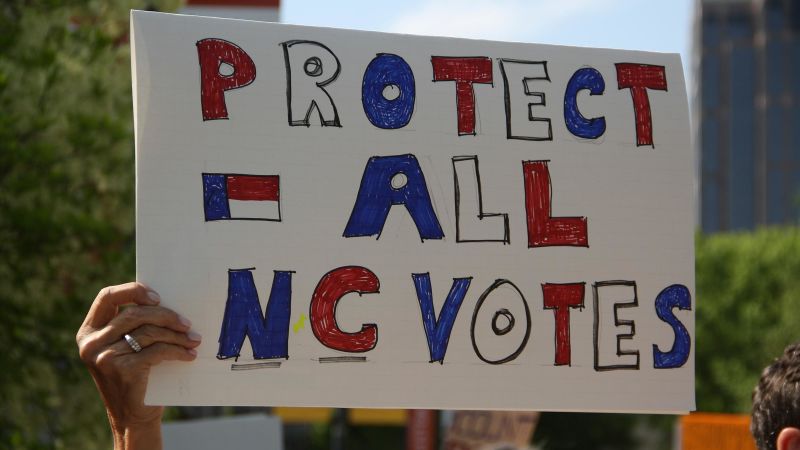The aftermath of the 2024 election has left many voters in North Carolina questioning the security and validity of their ballots, particularly in an anomaly that could jeopardize the integrity of the electoral process. Among these voters is Josiah Young, a 20-year-old college student originally from western North Carolina. Young, who had voted for the first time in this high-stakes election, is now in a precarious situation regarding the counting of his ballot, which he submitted while studying abroad in Spain.
Young utilized an online portal designated for military and overseas voters, believing he had fulfilled all necessary requirements for his vote to be counted. However, as the political landscape unfolded, he learned that his ballot, alongside those of thousands of other overseas voters, faced challenges due to a contentious lawsuit initiated by Judge Jefferson Griffin, a Republican candidate vying for a seat on the North Carolina Supreme Court against the incumbent Democrat Allison Riggs. Griffin is contesting the eligibility of voters like Young, who have not physically resided in North Carolina but are legally allowed to cast their votes due to their parents’ residency ties to the state.
The concern stems from a classification of these voters as “Never Residents,” a term coined by Griffin as part of his ongoing legal efforts. Young was flagged as a “Never Resident,” which threatens his electoral voice purely based on a potential clerical misunderstanding. When registering to vote, Young inadvertently checked a box indicating that he had never lived in the U.S. This misstep, perhaps made in error, has positioned him among those whose votes Griffin wishes to discount, despite the fact that he has had a voter registration history in North Carolina since 2023 and had previously participated in local elections.
As Young reflects on his situation, he expresses disappointment and frustration with the lack of communication from state officials regarding the status of his ballot. He believes he should have been notified about potential issues well before the election results were contested. The ongoing litigation surrounding these ballots has raised broader questions about the democratic process in North Carolina, with advocates concerned that such challenges could encourage aggressive legal maneuvers aimed at disenfranchising voters.
Election advocates and officials have indicated that Young is not alone in his misclassification. There are suspicions that numerous other overseas voters may have made similar mistakes on their registration forms. The challenges presented by Griffin have not only targeted Young but also approximately 260 other ballots from overseas voters. As the litigation continues, the state board of elections has been caught in a legal tug-of-war, with Griffin refuting efforts aimed at verifying the status of voters on the challenge list.
In a notable development, the North Carolina State Supreme Court ruled that the ballots categorized as “Never Residents” should be discarded without allowing these voters the opportunity to dispute their classification. This ruling has left an additional 1,409 overseas ballots under scrutiny regarding their eligibility based on a failure to present photo identification. The implications of this decision extend to a significant number of voters who may have submitted ballots without ID, further complicating the ongoing legal matters.
Riggs and her allies are advocating for the protection of these disqualified ballots. They argue that the state court’s measures disproportionately affect voters and that such actions undermine the democratic principles rooted in due process. They contend that voters who followed the regulations on Election Day should not face disenfranchisement due to newly explored legal interpretations that challenge their eligibility.
While tensions mount in this legal conflict, the GOP maintains that the lawsuit is simply about enforcing existing laws, asserting that election integrity is paramount. Spokesperson Matt Mercer emphasized the need for the State Board of Elections to adhere to the legal framework already in place. However, critics like Young and voting rights advocates argue that the retroactive disqualification reveals a problematic trend where candidates seek to influence election outcomes post-facto, rather than allowing voters to have their voices heard through the ballot.
An analysis conducted by the Southern Coalition for Social Justice has revealed additional discrepancies among the identified “Never Residents,” indicating that some individuals on the list have previously voted in person or possess North Carolina driver’s license numbers, further complicating the matter. Klein, an attorney with the coalition, points out that the potential for wrongful disenfranchisement is significant, particularly for voters who may not be aware of the implications of a single checkmark on their voting registration forms.
As the disputes unfold in both federal and state courts, the impact on North Carolina’s electoral integrity is far-reaching. The unresolved status of overseas ballots and the legal challenges they face prompt concerns regarding voter confidence and the broader implications for future elections. Without a clear resolution, it remains uncertain how the judicial outcomes will affect not only the current Supreme Court race but also the larger democratic landscape in the state and beyond.
The situation remains fluid, with various courts involved and the possibility of appeals extending up to the U.S. Supreme Court. As legal experts speculate on the potential for precedent-setting decisions, voters like Young wait anxiously, uncertain about the fate of their voices in the political process they



